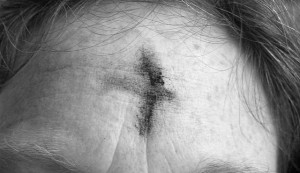 There is no greater materialist than a Christian observing Lent. You get ashes smeared on your forehead. You hear words like, “Remember you are dust, and to dust you shall return.” Those words are from the Book of Genesis.
There is no greater materialist than a Christian observing Lent. You get ashes smeared on your forehead. You hear words like, “Remember you are dust, and to dust you shall return.” Those words are from the Book of Genesis.
This Biblical thought about dust and the dustiness of all living things is taken up again in the third chapter of Ecclesiastes:
I said in mine heart concerning the estate of the sons of men, that God might manifest them, and that they might see that they themselves are beasts.
For that which befalleth the sons of man befalleth beasts; even one thing befalleth them: as one dieth, so dieth the other; yea, they have all one breath; so that a man hath no preeminence above a beast: for all is vanity.
All go into one place; all are of the dust, and all turn to dust again.
Not much in those words that a contemporary, non-religious materialist would disagree with. Yea, they have all one breath, and all are of dust.
Of course, one of the more amusing aspects of contemporary life is the degree to which its implicit materialism is rarely explicitly considered. The contemporary thought is something like the following:
“You are in fact dust. But try to forget that you are dust, or, at least, think about it as little as possible.”
It is a self-erasing materialism. A materialism that is afraid to look itself in the face. A materialism that recommends forgetting.
Lent is the very opposite. The point of Lent is to take your materialism so seriously that you are marked by it. The point is to get dirty with the dust and the ashes. The point is to remember.
In his essay “Remember, You are Dust,” Walter Brueggemann brings special attention to this passage from Genesis 2:7:
“And the Lord God formed man of the dust of the ground, and breathed into his nostrils the breath of life; and man became a living soul.”
This bit of text affirms four things, says Brueggemann. First, it affirms the material nature of our origin and composition, making it clear that human beings are, “an ‘earth creature,’ subject to all the realities and limitations of materiality.”
Second, because we are earth creatures, we belong to the earth and with all the other creatures that share the same condition. Third, “this mass of earth (‘dust’) is no self-starter.… ‘Dust from the ground’ by itself is no human person.”
Fourth and finally, “dust creatures” depend upon God’s gift of breath, “which is freely and graciously given without cause, but which never becomes the property or possession of the human person.”
Taking Genesis and Ecclesiastes seriously, then, taking the deep materialism of the Bible seriously, we come to the conclusion (thinks Brueggemann) that human persons are “dependent, vulnerable, and precarious, relying each moment on the gracious gift of breath that makes human life possible.”
So that is what we are reminded of on Ash Wednesday. We are reminded that we are dust. Strange dust. Dependent and vulnerable dust. Dust that got lifted up, somehow, mysteriously, without discernable cause, and utterly reliant upon the forces beyond our control that animate and sustain life.
That is to say, dust that has been breathed upon by God.
A big part of Lent, then, if Walter Brueggemann is right, is to remember our creatureliness. That’s the thing we otherwise want to forget. Contemporary life wants to help us forget it. We can distract ourselves from our creatureliness thousands upon thousands of ways. We entertain ourselves to death.
But ashes are still ashes. Dust is still dust. These primal elements call us back. The dust and the ashes are God calling us back to our materiality, our creatureliness. Being called back to dust is being called back to our primary vocation.
Brueggemann writes:
We are, as breathed on dust, called into the service and company of another, called to do work other than our own. This creature, formed of dust, is entrusted with the garden, with all the animals, and with all living things. Our creatureliness binds us to the role of steward, friend, and companion of all other creatures who share our fragility.
Driving up through North Carolina at the beginning of this year’s Lent, it was bitter cold. Rain had frozen on the bare limbs of the deciduous trees and in the needled, webbed arms of the pines. Cold registered in the single digits.
The frozen morning was bright with sun. Bright and cold in equal proportions. The air was so cold that the intense sun couldn’t unfreeze the water on the trees. The power to melt was transformed into a power to glint and shine.
A dazzling light was coming off the trees, like they were covered in tinsel. The trees were exploding with flashing sunlight, like a forest-sized kaleidoscope.
I thought, as I looked at it that the beauty of the world is not coming from somewhere else. It is not outside of creation. Matter generates beauty of itself. A most surprising dust.
Morgan Meis is the critic-at-large for The Smart Set (thesmartset.com). He has a PhD in Philosophy and has written for n+1, The Believer, Harper’s Magazine, and The Virginia Quarterly Review. He won the Whiting Award in 2013. Morgan is also an editor at 3 Quarks Daily, and a winner of a Creative Capital | Warhol Foundation Arts Writers grant. A book of Morgan’s selected essays can be found here.
Image above credited to MTSOfan, used through a Creative Commons license.











